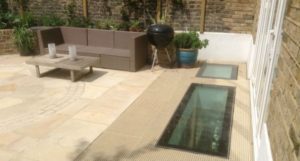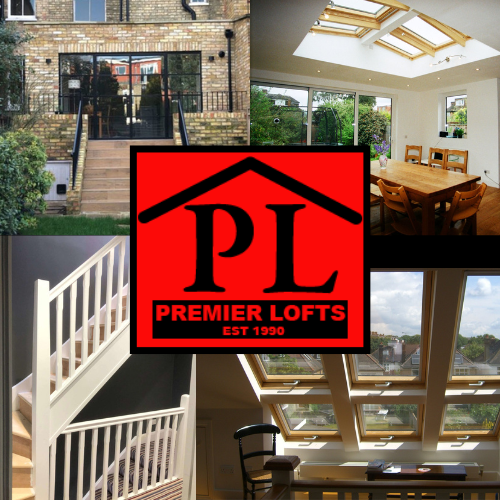Constructing a basement can be one of the most effective ways to increase your living space and add value to your home. Whilst around 80% of homes in Europe have basements, the UK is lagging behind with only 2% of houses having basements and 7% that make use of sloping sites. At Premier Lofts, we specialise in loft conversions but have teamed up with some leading specialist basement conversion companies in London, South and North England so that you can find the right basement construction for you. Our featured partners can help with the following:
- Constructing basements
- Excavating basements
- Headroom
- Lighting
- Waterproofing
- Damp proofing
- and more

So whether you are looking to increase your living space, add a cinema, extra bedroom, study, gym or game room to your home, simply contact one of our partners for a free and no obligation quote.
The advantages
Increased living space – There is a huge advantage in having that extra space at home, whether it is due to having a growing family or you need some extra space for an office or storage. Several homes already have some kind of basement or cellar but it ends becoming a dusty and dark place that no one wants to go into unless they have to check the meter readings or pull out something they’ve been storing for years. So you can make use of something that is currently wasted, whether it serves a purpose for the family or residents living there or for the very least, adds significant value to your home.

There are also several homes with big plots where it makes sense to add a basement because they might be constructing a new home but missing out on a big opportunity to increase space and the price of the property. Especially if you regularly have people to stay over or think that the grandparents might be moving in with you one day, you will be able to put the space to good use.
Energy Efficiency: Basements can help your household or office space be more energy efficient by up to 10%. It is all to do with the way the air moves in your property and makes use of the heat or cold during different temperatures. During the summer, it will make your house cooler by absorbing the heat from the upstairs and during winter, it will heat up your house as the earth surrounding it acts as a natural heat source and this will move up the house. Also, mixing the house air through the basement, the quality of air will match the rest of the home and not have that musty smell you would get with an unused cellar. You also get additional mass as a proper basement structure will provide wall and floor insulation. Overall, more energy efficient will save you money on your energy bills.
How much value can a basement add to my home?
By having a basement in your home can increase the value of your property by 20% to 30% according to The Independent. In a busy urban living space, area is tight and it can sometimes be harder to expand. But having that extra floor in your home and all the extra space is a huge advantage and means that your property is considered more valuable in the eyes of future buyers and property investors.
Policy expert states that a basement could increase the property value by around 11% and consider that there are several factors that influence the price. For instance, just how much living space it adds is very important – does it give you a new gym, work office and home cinema or is there just enough space for a utility room? The level of headroom is also important with some basements having very low ceilings, it does not add significant quality to the home. Also, whether the basement conversion is positioned so that you can walk in and out of it from your front door or out to your garden, adds a lot of benefit to the quality of your living. For example, you could have a nice den or game room with the opportunity to walk outside too – and this can be good for social purposes.
Planning permission for a basement
If you already have a basement or cellar that is dry and dusty, you may not need planning permission because it is simply getting a ‘change of use.’ After all, the space already exists, you are just renovating it and making more functional in your home or property. However, if you have to change the ceiling height because your current cellar is too low, this might require planning permission because it is like you are doing an extension.

If you are excavating into the ground, this will certainly require planning permission because of the impact it makes to the road and neighbours. Also, if you are creating a light well which is a way to add natural light to the basement such as glass ceilings or windows, this will also require planning because of the way it changes the external of the home. See an example here.
You have to tell your neighbours if you plan on building through walls or on shared property structures. As part of the Party Wall Act 1996, you have to consult with any neighbour within six metres of your home or if you share a wall with them in any way, including a garden wall, but not a garden fence. This is simply to ensure that no physical damage is made to your neighbours’ homes during the building process. For more information about planning permission, visit Planningportal.co.uk
How can you add a basement to your home?
Firstly, the professionals will look at the foundations of your home which needs to be strong, on solid soil and extend below the frost line. All being well, the basement conversion company will begin to excavate the basement. Creating a ‘cut line’ they mark out an outline for the basement area and then fill it with concrete blocks or poured concrete to make it a solid outline.
Waterproofing: Part of making your basement liveable is adding waterproofing materials to avoid any musky or damp smells from emerging in the future. This is usually achieved using tanking, using some form of a membrane, such as bonded sheet or cavity drain membranes.
Ductwork: This refers to how the air will be circulated from the basement to the rest of the house, whether it is heating or air conditioning. It is ideal to put any ventilation or air ducts in a space that will not be intrusive to any living or being in that space – so mapping out the size of your ducts based on height and width is advisable.
Headroom: There is no limit to the headroom for a basement unless it is for a stairway. One has to consider the ideal height for their new rooms and take into account that any ductwork and waterproofing might affect the eventual headroom, so there aren’t any surprises when it is completed.
How long does it take to build a basement?
A standard basement conversion can take between 12 weeks to 20 weeks, obviously depending on several factors such as planning permission, weather conditions, size of the basement, headroom, specification and more. The spring and summer is probably the best time to do a basement construction because you are going to be less affected by any adverse weather conditions. Simply speak to one of our partners to get an idea of how long it will take.
How much does it cost to add a basement in your home?
The typical cost of a basement conversion for an area of around 50 square feet is £25,000, which works out to £500 per square foot. There are several factors that will affect the cost of your basement including:
- Digging below the water table
- Ground conditions
- Drainage
- Poor access
- Lowering floors to increase headroom – £250/m2
- Underpinning parts of the building – £500-1,000/m2
- Specification
If your home is brand new, it will obviously be much easier to build a basement in, rather than excavating a new home which can cost three times as much. Excavating a basement below an existing house can easily cost three times as much as building a basement beneath a new home. Experts say that the construction costs for a basement in a new home are very similar to if they were above ground. The most expensive type of basement is the retrofit (ie. constructing a subterranean storey from scratch): even without waterproofing, will cost around £2,500/m2.

